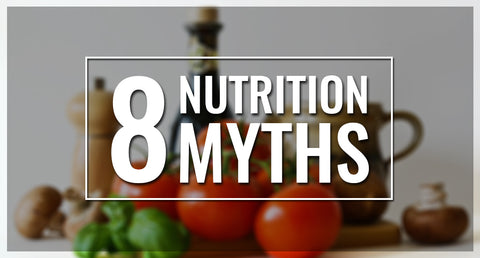When your peer decides to go on a low-carb diet or your friend advice you to drink gallons of water throughout the day, how often do you lose your mind or feel how irresponsible and unhealthy you are? People today are religiously hunting for “Good options” of food that are low in calories, high in protein and low in fat. And if you too are on the verge to adopt these “healthy habits", let us help you decide whether or not you should make the attempts as we unveil you some popular myths on nutrition.
Myth #1: Only protein contributes to muscle building
This is a common myth heard and followed rigorously, especially by strength athletes. The craze to build muscles among athletes and several fitness enthusiasts are severely high that makes their plate comprise largely of protein-rich foods, lacking those rich in other nutrients. This, however, is a myth because to build muscles, one must also add sufficient carbohydrates along with protein while engaging himself in a good training program. When a body lacks enough carbohydrates, the consumed dietary protein tends to get converted into energy which devoid muscles from getting the required protein because the balance between both macro and micro nutrients is important for gaining muscles.
Myth #2: Fish is the only source of Omega-3 fats
Right from promoting a healthy brain and improving the cognitive function of a body, Omega-3 fats has gained popularity among people of all ages. Perhaps more recognised for its contribution towards a healthy heart, it has been long said and believed that marine-based supplements are the only ways to get the healthy fatty acids EPA (Eicosapentaenoic Acid) and DHA (Docosahexaenoic Acid). However, a person can gain the benefits of ALA (Alpha-Linolenic Acid), the third omega-3 fatty acid necessary for skin, hair, cardiovascular and even heart health, through plant-based foods like flaxseed, soybeans, canola oil and walnuts among the many. Buy Omega 3 capsule.
Myth #3: White bread is an unhealthier option to brown bread
When you crave for a sandwich or maybe a sub, how often do you demand brown bread and strictly inform the waiter to not include white? Colours shouldn’t matter when buying bread, but its ingredients should be given complete attention. It is always wise to check the list of ingredients to finally judge which bread best suits your health and taste because many dark breads come with added colours giving no added benefits to the body.
Myth #4: Water is everything a body requires during any intense exercise
Sweat comprises of sodium, chloride, potassium, magnesium and calcium along with water. So when you sweat during prolonged exercises, you tend to lose all of these and feel fatigued and lethargic. It is therefore important to replenish the lost electrolytes to avoid cramps and maintain the integrity of muscles. Optimum performance can be achieved through supplements rich in carbohydrates and electrolytes to get the gradual supply of energy while keeping the body hydrated.
Myth #5: Diet sodas do not make you fat
Diet sodas are rich in artificial sweeteners which do not add calories, but unfortunately, elevates the level of sugar craving. This leads an individual to consume more than necessary resulting to the fluctuation of insulin levels in blood and making him more prone to fat accumulation. So, if you do not wish to end up obese and want to maintain your body, replace your soda drinks with healthier and natural options such as coconut water, buttermilk or lemon water.
Myth #6: Egg yolk is bad for health
Many people believe that egg yolks are bad for health due to its fat content. However, you must also know that those missing the yolks are also restricting themselves from many important micronutrients like Vitamin B-6, Vitamin B-12, Vitamin E, Zinc and more. Egg yolk is a storehouse of good fats including omega-3 fatty acids and protein. The bad reputation of eggs today is because of its cholesterol content but according to research, while a large egg contains around 5 g of fat, less than 2 g of its content is saturated fat. This simple means that an egg yolk supplies the body with less than 10 percent of the daily saturated fat recommendation. Therefore, you can enjoy your whole egg once or twice a day unless there are medical restrictions for the same.
Myth #7: All calories are the same!
Now people tend to count calories and believe that any form of food consumed, whether junk or healthy, comprise the same form and amount of calories. This, however, is false and can result in a series of lifestyle diseases because of the absence of micronutrients like antioxidants, vitamins and minerals. The quality of calories obtained from a plate of chapattis with a bowl of rice, lentils and vegetables is unbeatable to that of a plate of juicy burger scrumptiously garnished with fries and grilled vegetables.
Myth #8: Using one type of oil proves healthy
Many Indians are loyal towards their own favourite form of oil. While many prefer mustard oil to prepare their daily meals, there are others who favour only olive or refined oil. However, this shouldn’t be followed as the composition of each oil is different in terms of MUFA-PUFA combination, while giving the same amount of calories. Therefore, you should always focus on the cycling of different oils to reap maximum benefits of each.

